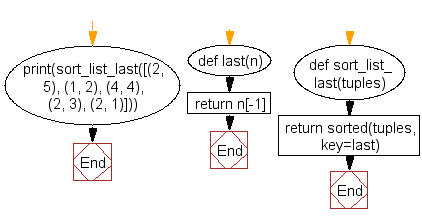Python: Get a list, sorted in increasing order by the last element in each tuple from a given list of non-empty tuples
Sort Tuples by Last Element
Write a Python program to get a list, sorted in increasing order by the last element in each tuple from a given list of non-empty tuples.
Visual Presentation:
Sample Solution:
Python Code:
# Define a function called 'last' that takes a single argument 'n' and returns the last element of 'n'
def last(n):
return n[-1]
# Define a function called 'sort_list_last' that takes a list of tuples 'tuples' as input
def sort_list_last(tuples):
# Sort the list of tuples 'tuples' using the 'last' function as the key for sorting
return sorted(tuples, key=last)
# Call the 'sort_list_last' function with a list of tuples as input and print the sorted result
print(sort_list_last([(2, 5), (1, 2), (4, 4), (2, 3), (2, 1)]))
Sample Output:
[(2, 1), (1, 2), (2, 3), (4, 4), (2, 5)]
Explanation:
In the above exercise -
def last(n):
return n[-1]
In the above code we define a function called 'last' that takes a single argument n. This function returns the last element of 'n'.
def sort_list_last(tuples): return sorted(tuples, key=last)
In the above code we define a function called 'sort_list_last' that takes a single argument tuples. This function sorts the input list of tuples based on the last element of each tuple, using the sorted function and the key parameter. The key parameter specifies a function to be called on each element of the list to determine the sort order. In this case, the 'last' function is used as the key function, so the sorting is based on the last element of each tuple.
print(sort_list_last([(2, 5), (1, 2), (4, 4), (2, 3), (2, 1)])) -> This line calls the sort_list_last function and passes in a list of tuples [(2, 5), (1, 2), (4, 4), (2, 3), (2, 1)]. The resulting sorted list of tuples is then printed to the console using the print function. In this case, the expected output would be [(2, 1), (1, 2), (2, 3), (4, 4), (2, 5)].
Flowchart:

For more Practice: Solve these Related Problems:
- Write a Python program to sort a list of tuples based on the sum of their elements.
- Write a Python program to sort a list of tuples based on the frequency of their last element.
- Write a Python program to sort a list of tuples in descending order by the first element.
- Write a Python program to sort a list of tuples where each tuple contains a string and a number, based on string length.
Go to:
Previous: Write a Python program to count the number of strings where the string length is 2 or more and the first and last character are same from a given list of strings.
Next: Write a Python program to remove duplicates from a list.
Python Code Editor:
What is the difficulty level of this exercise?
Test your Programming skills with w3resource's quiz.
